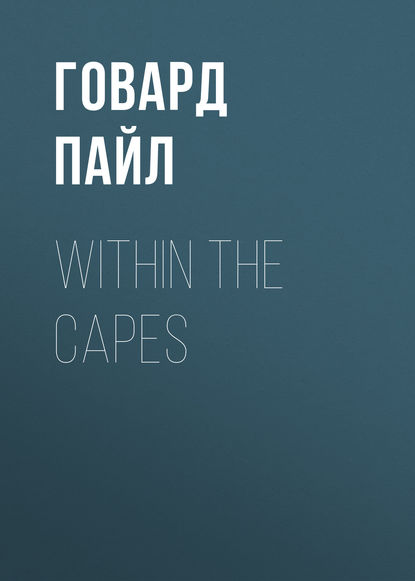По всем вопросам обращайтесь на: info@litportal.ru
(©) 2003-2024.
✖
Within the Capes
Настройки чтения
Размер шрифта
Высота строк
Поля
“Nothing.”
Tom put his hand to his forehead, for things were swimming around him; then he gave a short laugh, but there was a quaver in it. “You frightened me pretty badly, Will,” said he; “I don’t deny that I felt as though you were dragging my heart out by the roots.”
“See here, Tom, you don’t look well,” said Will; “let me call for a glass of brandy for you.”
“I don’t want any brandy; I wouldn’t mind having a drop of water, though.” There was a pitcher standing on the table beside him; he tilted it and looked into it and saw that there was water in it; then he raised it to his lips and took a deep draught of it. “What did you scare me so for?” he said, half angrily, turning on Will again.
“I didn’t mean to scare you, Tom,” said the other; then he hesitated for a moment or two. “Look here, Tom,” said he, “you’d better go home; your mother has something to tell you. Your father was in town not half an hour ago; I saw him at Bradley’s blacksmith shop. I wish to heavens you’d been a little sooner; you might have ridden out home with him. If you’ll wait a bit, I’ll slip over and borrow uncle’s gig and drive you home.”
“I don’t want to wait; I’ll walk,” said Tom. Then, “Look here, Will; what are you so anxious for me to go straight home for?”
“What makes you think that I’m anxious?”
“You ain’t answering my question, Will Gaines.”
“I have no reason for wanting you to go straight home, except that I suppose your folks’ll want to see you.”
“Is that all?” said Tom, looking sharply at the other.
“Yes.”
Tom looked at him a little while longer, and then he turned away. He did not believe Will, but he saw that nothing more was to be gotten out of him.
“I’ll tell you what I’ll do,” said Will, presently, “you walk on out home, and I’ll go over and get uncle’s gig and drive after you, and pick you up. It won’t do to run in on your people without their knowing of your coming. Your mother ought to know of it before she sees you.”
This was all very true, though Tom felt that Will’s plan was laid in order to secure his going home without stopping. He said nothing of his thoughts, however, but left the tavern, and started for home.
He walked briskly along the dusky turnpike road, but there was a dull feeling of unhappiness resting upon his heart, for Will’s words, and looks, and tones, all told him that there was something wrong. So he came at last to the foot of the hill, where the turnpike road crosses Stony-Brook by the old county bridge. On the other side of the stream is a by-road that leads off from the highway and runs through the woods. Tom knew it well, for it was the old mill road, and led to Elihu Penrose’s house. Many a time had he walked it, and well he knew every bend and turn of it. The last time he had passed along it his heart had beaten high with love, and hope, and high resolve, albeit there was the bitterness of a coming parting lurking at the bottom of it. When he came to the spot where the mill road opens on the pike he stood still, and, as he stood, all the fear that had rested upon him since his homecoming seemed to gather and intensify into a dark and nameless dread. What had happened? What could it all mean?
As his fears grew stronger his love waxed stronger with them. He looked back along the turnpike road – there was no signs of Will Gaines. Why should he go home, and not see his own dear love the first of all? “God bless her!” said he, with quivering lips, “I’ll not go home first; I’ll go and see her – my darling!”
So he left the highway, and walked down the road through the woods. The brown leaves that were beginning to fall rustled beneath his feet, and the yellow patches of sunlight slid over his head and shoulders as he walked beneath the shadow of the grey trees along the roadside.
Then he came out of the woods and into the open sunlight again. Now he was on the grass-bordered foot-path; on one side of him was the white dusty road, and on the other the mill-race, with the row of pollard willows standing along it. In front of him were the white walls of the mill-house, with the vines clustered around the end of the old well-remembered porch, just as he had seen them last. As he came closer he saw a slender girl’s figure sitting in a high-backed rocking chair, half hidden by the net-work of the vines around her.
It was Patty.
Tom’s heart gave a great leap within him; then stood still, and then began to beat furiously. He paused for a moment, gazing at her, his hand resting on the top of the picket fence in front of the garden; then he went forward again, but very slowly.
She was sitting bent over some sewing that lay spread out on her lap. He stood for a second or two at the green gate that led up to the porch, and then he laid his hand on the latch. At the click of the latch Patty raised her head, and Tom saw that she, like others that he had met, did not know him.
She arose and stood watching him as he came slowly up the path; his heart beating as though it would smother him.
He reached the porch; – one step, – two steps, – three steps, – and he stood upon it and looked at her.
Then he saw a strange frightened look come slowly into her eyes; she reached out her hand and laid it on the top of the rocking chair near to her.
“Patty!”
There was a space of dead silence, through which Tom heard and noticed the sound of rushing water and the clattering of the mill. He did not go a step forward, for, as he looked at her, there was that in her face that chilled him through and through – it was as though a gulf had opened between them.
Her face was as white as death, and Tom saw the fingers of the hand that rested on the top of the rocking chair, quivering nervously. She moistened her lips with her tongue, and at last she spoke, but in a hoarse whisper, and so low that he could hardly hear the matter of the words:
“Tom – Tom – Oh, my God, Tom! is that thee?”
“Yes, Patty; it’s me! I’ve come back to thee after a sorely long time! Why don’t thee speak – why don’t thee say something to me? What’s the matter, Patty?”
“Wait – wait – let me think!” said she, putting her finger to her forehead, “they all told me that thee was dead – they said that thee was drowned. Can dead people come back again?”
“Patty! Patty!” cried Tom, “my own darling! tell me; what does this mean?”
By this time the tears were running in streams down her pale cheeks; she made no effort to wipe them away, and did not seem to know that they were flowing.
“What is the matter? – Patty, tell me,” said Tom, again.
“Oh, Tom! I – I – am going to be married to-morrow!”
I do not know how long it was that Tom stood there, staring blankly at her. His throat was dry and husky, and he felt the muscles of his face twitching every now and then. It was Patty who broke the silence.
“Tom!” she cried, in a choking voice; “dear Tom! don’t look at me in that way – thee breaks my heart! Say something kind to me, Tom – speak to me!”
“Who’s thee going to – who’s the man, Patty?” said Tom, dully.
“Isaac Naylor. Oh, Tom! I was urged to it so that I couldn’t help myself. They all told me that thee was dead. Even thy mother said thee was drowned!”
The muscles of Tom’s throat had tightened until he felt as though he was choking. He stood as though uncertain what to do, for a little while; then he said, “I – I guess I’d better go – go home, now; there’s no use my staying any – any longer.” Then he turned away and went stumbling blindly down the porch steps. He reached the gate and fumbled for a little while, hunting for the latch; then he opened it and went out into the road. There were a few chickens dusting themselves in the path; he stood looking stupidly at them for a little while, his hands hanging limp at his sides. Then he turned and walked heavily away, without looking back.
CHAPTER XV
TOM GRANGER walked along, scarcely knowing where he was going. After a while he stopped and looked about him, and he saw that he was standing in the road not far from the highway. Around him was the silent woods; in front of him was the sunny highroad, about three hundred paces farther on. He felt that he could not go out into it just now. He flung himself down on the grassy roadside, burying his face in his arms, giving himself up utterly to the despair that was upon him. No sound broke the silence of the autumn woodland but the gurgle of the rocky brook across the road, the sudden rustle of the trees as the breeze rushed through them now and then, and the rattling of the dead leaves stirred by a breath of air.
Tom lay heeding nothing, thinking nothing, for his heart was too full of the bitterness of his troubles to give place to aught else. How long he lay there he cannot tell; that which aroused him was the sound of footsteps coming down the road from the highway. Then he sprang to his feet, for he could not bear that any one should find him lying there. He saw that it was Isaac Naylor who was coming. Then Tom strode out into the road and stood directly in front of him, so that the other could not pass him.
“Does thee know who I am, Isaac Naylor?” said he; then, without waiting for an answer, “I’m Tom Granger!”
Maybe the Friend’s face grew a trifle whiter than it was used to be; nevertheless, he stood his ground, though he looked around and behind him, as though to see whether any help was near to him in case that the need for it should arise. I have no doubt but that Tom’s face was white, his eyes bloodshot, and that he looked wicked and dangerous as he stood in the pathway in front of the other. For a while Isaac stood with bent head and with hands that trembled a little clasped in front of him. But presently he raised his face and looked calmly into Tom’s eyes.
“I heard in town that thee had come back, Thomas,” said he, “and I was both glad and sorry to hear it. I was glad that the Good Father had spared thy life and sorry that thee had come back just now. I see where thee’s been and I know what thee’s heard. I’m sorry – very sorry.”
Tom steadied himself for a moment before he spoke. When he replied, it was in a heavy, monotonous voice: “Yes; I’ve been to see Patty and she’s told me all. I do believe it’ll break her heart. Poor girl! poor girl!” Then he stopped for a moment. Hitherto he had spoken in a low, dull voice; but as he thought of Patty’s grief, his self-restraint gave way and he burst out passionately, “She’s mine, Isaac Naylor – she’s mine! She loves me and no other man in all the world! By the eternal, neither thee nor any other man shall take her from me! I’ll let no man take her from me; I don’t care who he may be!”
He waved his hands about furiously as he spoke, clapping his palms together and pouring the words out upon one another in a torrent. Isaac Naylor must have had some fear that Tom would do him a harm in his passion, for he stepped a pace back. “Come, come, Thomas!” said he, soothingly; “don’t be violent; I’ve done thee no harm – at least, I’ve done thee no witting harm. Every one said that thee was dead; even thy own people said so. Go thy ways, Thomas, and let me go mine in peace. Come; let me past!”
“No, by G-d! Thee’ll not go a step from this till I let thee. Thee shan’t see Patty this day! She’s mine and no other man shall have her for his wife! Will thee give her up to me, Isaac Naylor? Will thee give her up? Will thee give her up, I say?”
Every time he repeated this he came a step forward and Isaac moved a step back. Tom was more than half crazy with his fury and the Friend seemed very anxious and looked back at the road.
“Thomas! Thomas!” said he, “don’t be violent; be reasonable; how could I make thee any such promise as that? Let me past, I must see Patty; there’s reason why I must see her now.”












